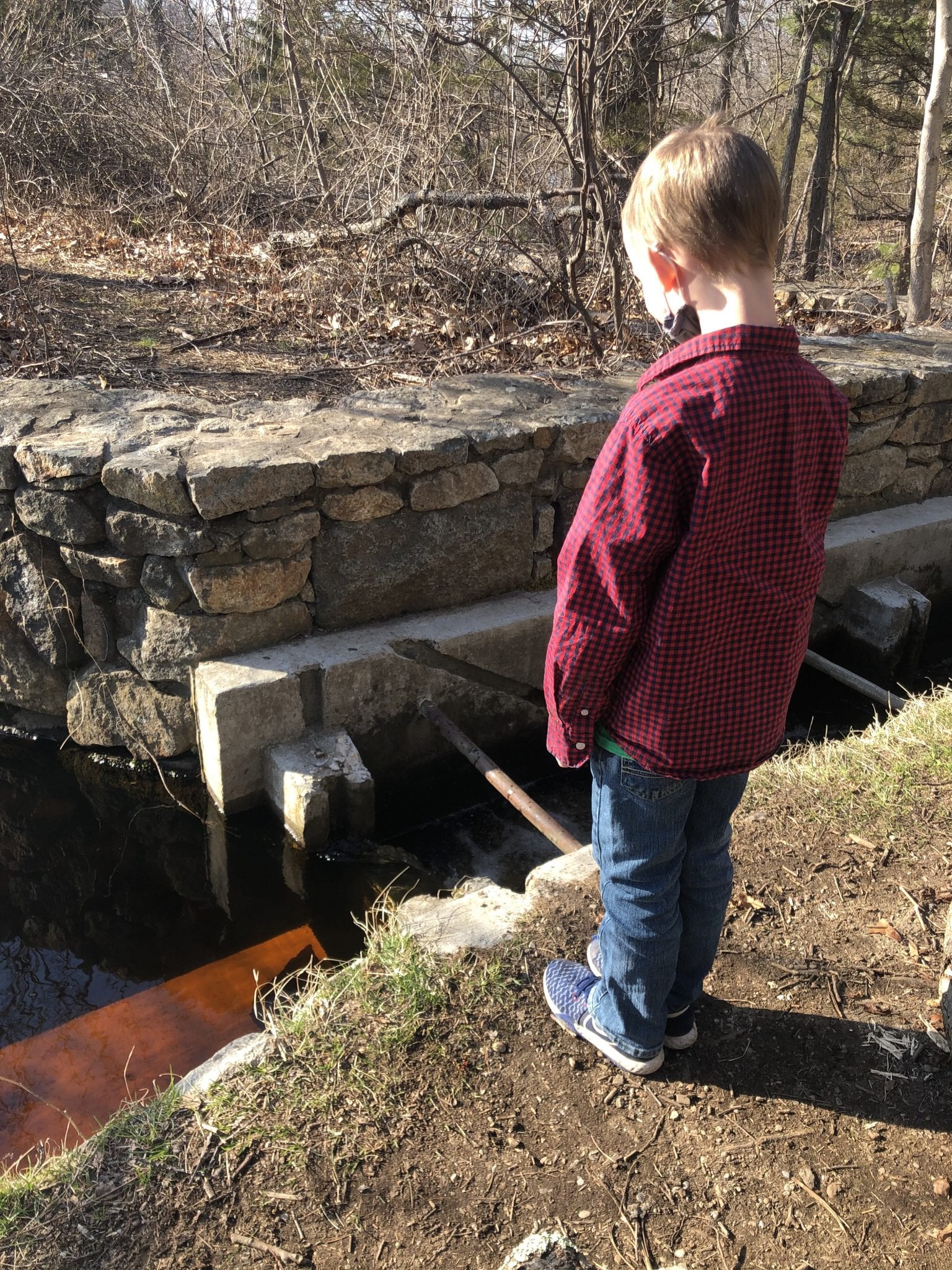
April 21, 2021, Submitted by the Weir River Watershed Association
Late March sun brightened the trailhead at Hingham’s Foundry Pond, but Anna Corbett, 11, was looking for another sign of spring. “We’re going to search for herring!” Guided by the sound of rushing water, Anna found the Foundry Pond dam and the fish ladder alongside it. But herring were nowhere to be seen.
She was probably too early, says Samantha Woods, a coastal and marine scientist and founding member of the Weir River Watershed Association (WRWA). “April vacation has typically been a good week to see herring around here, after it warms up, and especially after rains.”
Anadromous fish, herring are born in freshwater, swim to the ocean as juveniles, then return to the water where they were born to spawn in the spring. They make the roundtrip journey annually throughout their reproductive lives. In Hingham, the herring swim from the estuary into the Weir River, up to Foundry Pond, then farther up the Weir River to spawn in Triphammer Pond. Fish ladders provide graduated detours around two dams that would otherwise make their journey impossible. The WRWA sponsors an annual Weir River herring count in conjunction with the North and South Rivers Association.
Herring were once so abundant that they gave the Weir River its current name. A “weir” is a type of fish trap used by Native Americans and, later, by the colonists. In 1637, a herring fishing company was permitted to build a weir on the river then called “Lyford’s Liking.” It has been known as the Weir River ever since. In neighboring towns, fish ladders teem with herring and draw crowds, but numbers are now scarce in the Weir River. In the 2019 count, observers did not count any herring at all. In 2020, with the help of volunteers from the South Shore FlyCasters, multiple sightings of schools of herring were seen at the ladder, and some were seen passing, providing evidence that there is still of small herring population using the river.
There are many reasons for the declining numbers, from the steep steps of the Foundry Pond fish ladder to bycatch fishing in the Atlantic. Most concerning is increased consumer demand for water, especially when coupled with drought conditions. Accord Pond, where the Weir River originates, and multiple wells along the Weir River, supplies water to all of Hingham, Hull, and parts of Cohasset. Last year, downstream sections of the Weir River went dry from late July to October. When water is too low, the juvenile fish get trapped in Triphammer Pond and Foundry Pond. Additionally, trees and shrubs usually found at the river’s edge grow in the waterbed itself due to the flow alterations created by dams and water withdrawals, creating obstacles in the herrings’ upstream journey.
The shrinking herring population is cause for concern. Herring are a keystone species, relied upon by other fish and birds as a food source. Additionally, “the herring are a harbinger of the condition of the watershed,” says Ms. Woods. “The watershed is a finite resource. The lack of herring indicates that things aren’t going as well as they should.” She also notes that, despite the spring season, Hingham is already in a Level 2
drought.
Many volunteers are working to support the herring. The South Shore Flycasters, a fishing organization and members of the watershed association, cleared the riverbed of alder trees and other vegetation. The WRWA is planning a public clean-up day on May 1, from 9 AM – noon; information can be found on the WRWA Facebook page. And Hingham High School science students are officially counting herring for the first time this year. HPS Science Department Director Kathryn Roberts says that the students have not yet observed any herring on the fish ladder, but that participating is valuable. “Zero data is still important data to collect.”
If you would like to help with this year’s herring count, please sign up for training and information here: https://nsrwa.dm.networkforgood.com/forms/2021-river-herring-count-registration


The correct link to sign up for the herring count is here: https://nsrwa.dm.networkforgood.com/forms/2021-river-herring-count-registration?fbclid=IwAR0xJZjxytcfV1Bg_4YW6oehlr_lVrzm45vqzRvKFi4RYKrZHneX5vlg-ZM